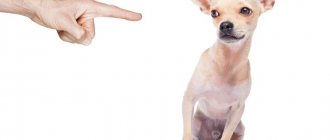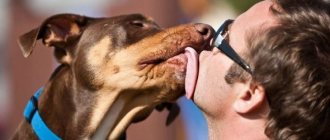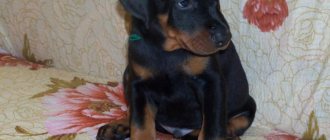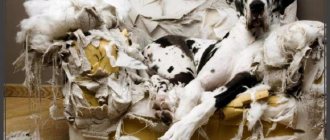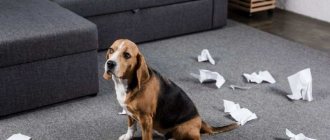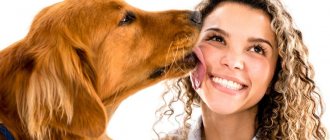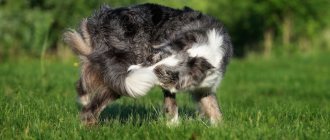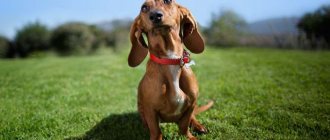The main reasons why this happens
The reasons why a pet gets dirty in the house can be different. Frequent urination occurs due to drinking large amounts of water. Or perhaps the owners did not toilet train him. The problem can arise if the pet is allowed to “do business” in the yard or in a diaper, and then he can become confused about what is allowed and what is not. The main reasons include:
Overexcitement. Involuntary urination due to a surge of emotions, perhaps in puppies and some adult dogs, which indicates an expression of feelings at the sight of the owner.
Shock. Urination in the home can be a reaction to fear. This is how a shaggy friend reacts to separation from his owner.
Change of scenery. Loud noise, fireworks, punishment, can cause the appearance of puddles.
Disease. The dog is toilet trained, but began to pee in his sleep and in the house. It is advisable to show the animal to a veterinarian.
Resentment. This happens when a dog takes out its anger on its owner.
Irregular walks. Puddles appear when the animal is not taken outside so often. It is important to train your dog to go to the toilet on a schedule.
Estrus. During this period, urination occurs more frequently due to hormonal imbalance.
Behavioral problems
Some dogs, when happy, lose control of their bladder.
Whether it's your return home or a visit from friends or any other exciting factors, all of them can trigger your pet. Moreover, often dogs do not even try to take a position for urination, happily smearing everything on the floor with their tail. Solution.
What you shouldn't do is scold your dog. Shouting and slapping can only make matters worse and lead to the problem of “submissive urination” that is common in many social animals. What can help is your peace. When you return home, do not rush to rush to your pet with exclamations of joy. This is not acceptable in a pack. Leaders most of the time ignore the rest of the pack, and the latter themselves must earn attention through devotion and obedience. Do the same. Ignore your dog until he calms down and then reward him with attention.
Be sure to talk to those close to you who communicate with your pet so that they also follow the rule: no strong emotions towards the dog.
How to help your four-legged friend
Why you can’t “humanize” a dog’s behavior
After finding out the reasons why such a nuisance happens, you can take action.
If the cause is a serious illness, then it is necessary to take the dog for examination to a doctor.
As for urinary problems due to behavioral difficulties, you need to consult with a specialist on how to eliminate separation anxiety. You can take a training course and teach your pet what to do and what not to do.
The animal pees at night. You need to control the amount of water you drink.
There is no need to punish the dog, because after this the situation can only get worse. On the contrary, reward more for good behavior.
puppy pees with joy
Why out of joy? Oh my God! How people want to think that someone is peeing in their pants from the happiness of their appearance!
This “phenomenon” is called submissive urination. It is they who do not rejoice at you, but show their instant submission. You all know perfectly well how such dogs react when they pee. The dog hunches over, head down, sinks to the floor, presses against the floor, etc. etc. By the way, this happens completely involuntarily and they don’t realize what they are peeing.
As easy as pie:
1. The dog is afraid of you (you once scolded it strongly, for example) - as soon as you appear, it immediately “puts down its arms” like “that’s it, that’s it, I’m silent!”
2. The dog is confused, but knows that you are stronger and bigger. She just doesn't know how to communicate with you. Let me explain: you spend little time with your dog. Dogs are also like children - you need to get to know them, you need to establish relationships with them. And not just - he took him out for a walk, fed him, stroked him on the head once a day, and that’s it. You and your dog must have a relationship. The most real ones. Just like with any member of your family.
Yes, most often they outgrow it. But just start spending more time with your dog. I promise you - the writing will stop. Try to show your dog that you are not a scary creature at all and that you can be trusted) Make sure that she feels you, do not send contradictory signals (dogs are great at reading all your gestures and body language), and that she knows you like your own child. Physical contact helps a lot - pet the dog on the head more often, fool around with it, play. BUILD RELATIONSHIPS.
Don’t worry, it’s normal, she’s just a baby))))
My one-year-old over there got confused yesterday. We haven’t gotten our house dirty since we were 5 months old, and then the melons got crunchy and the long-awaited guests arrived, I waited all day, couldn’t get away from the door, well... in general, even an old woman can get into trouble)))) Then the dog got so scared that he was in the corner He sat for five minutes, although no one scolded him (((So, wait, grow up, cherish and nurture your baby)))
No, don’t confuse one with the other - you just couldn’t stand it.
And here we pee not only out of joy. For example, if you call her: “to me,” she sometimes comes up normally, and sometimes, sitting on her butt, she crawls up, wags her tail and pees. And today I was afraid of particularly ardent praise from the trainer and peed myself. Is this normal???
See above.
Modified April 9, 2010 by Cherry Blossom
Some recommendations on how to retrain a dog so that it does not pee in the house
Why does a dog growl at its owners and what to do about it?
As soon as you notice that the dog wants to make a puddle, you need to give the command “Fu” and slap the back of the body.
It is forbidden to be angry with your pet for “surprises” made a long time ago, but to praise him if he relieved himself in the yard.
Increase the time of walks, interest the dog in active games.
If a dog pees when it sees its owner, then when you get home, ignore it for a while. And when the pet calms down, you can pay attention to it.
If the dog makes puddles out of fear, then you need to eliminate the excitement and noise from the street.
Sometimes the pet is jealous of the owner and takes out his anger. In this case, it is recommended to intensify training. Remain calm and patient, without restricting affection when interacting with the dog.
Answer
Dog urinary incontinence is a common problem that every third breeder faces. It is generally accepted that it occurs in a pet in old age, but many young dogs suffer from incontinence. It is often found in four-legged street children who lived on the street without proper care; Some veterinarians claim that dachshunds, huskies, French bulldogs, and cocker spaniels are particularly prone to this disease.
Causes of frequent urination
Natural causes
If your dog begins to urinate frequently, this may be due to the following reasons:
- frequent stress and fear;
- nervous state;
- severe overexcitation.
This is not a complete list, but these are the most common
.
If the cause of constant urges is fear, nervous tension and overexcitement, then you should not worry. This reaction is normal for an animal, as they are guided by their instincts. Males mark with urine to mark an object or territory that they consider theirs
. To prevent such incidents from happening, you should adjust your pet’s behavioral instincts.
In a situation where a dog urinates due to behavioral characteristics, reprimand and punishment can only make the situation worse. Treatment for this behavior will be ineffective. Only re-education will help get rid of this problem.
Males love to mark their territory; to cope with this problem, you can sterilize the animal. In this way you will also reduce the manifestations of the animal’s sexual instinct.
Features of age
As dogs age, their smooth muscles begin to weaken, so your dog may feel the need to urinate more frequently. This problem cannot be completely eliminated
, as this is a natural aging process. But you can use special supportive medications.
Dogs may urinate frequently when in heat
. This phenomenon manifests itself especially often in young females who have not yet had sexual intercourse. During estrus, the animal feels pain in the lower abdomen, which provokes frequent bowel movements. No special treatment is required, just walking the dog as often as possible.
Injuries
Damage to the spine can cause increased urination. The likelihood of getting a back injury increases in those dog breeds that have a long spine. Dachshunds are at risk.
Childbirth can also provoke the development of such a pathology.
. During this process, nerves can become pinched and the dog will feel weak in the limbs and the sphincter muscles will also weaken.
To determine the cause of the pathology, the doctor conducts a comprehensive examination. If necessary, surgery may be prescribed.
What it is?
Urinary incontinence is involuntary, uncontrollable urination by the pet. Statistically, this complication affects approximately one in five female dogs, and one in six male dogs. The amount of fluid the animal produces varies from small “leaks” to complete emptying of the bladder.
Small puppies tend to relieve themselves at home. This is done unintentionally. Growing up, puppies learn behavioral norms - the owner shows the ward that going to the toilet is only allowed outside. A clearly established walking routine helps the animal easily remember the daily routine and learn to control natural urges. However, if an adult pet stops holding urine while at home, the breeder should be wary - there are cases where advanced incontinence causes serious skin diseases, kidney infections, and bladder infections.
Urinary tract problems
If your dog suddenly starts peeing in the house (or other inappropriate places), it may be caused by a urinary tract infection.
This is one of the most common causes of inappropriate urination and one of the most common health problems in dogs.
Before you get upset with your dog, contact your veterinarian for an examination and consultation. Your veterinarian will likely want to take a urine sample from your dog to perform a urinalysis and possibly a urine culture. This test is done to look for bacteria and abnormal cells in the urine. If your veterinarian diagnoses a urinary tract infection, the next step is a course of antibiotics.
© shutterstock
Other possible urinary problems that your veterinarian may look for include cystitis (inflammation of the bladder), crystals in the urine, bladder stones, structural abnormalities, and even tumors. Most urinary problems can be treated with medications, supplements, and/or diet changes. In more extreme cases, problems such as bladder stones may require surgery.
If your vet doesn't find a urinary tract problem, the next step is to look for other potential health problems.
Symptoms
The most obvious symptom of incontinence is, of course, involuntary urination (if the dog is trained to relieve itself during walks). The main signs that serve as a kind of guide for the dog breeder are highlighted:
- Skin irritation;
- Strong unpleasant odor of discharge;
- Frequent licking of the vaginal area by the dachshund;
- Urinary dribbling.
Dog owners may notice that the dog's resting place is dirty with its feces.

